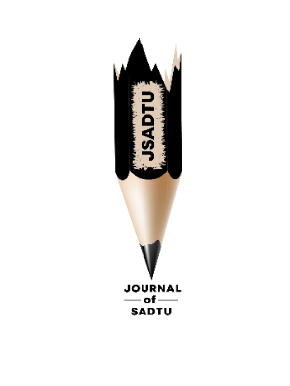- Home
- Our Peer Review Policy
Our Peer Review Policy
The Journal of South African Democratic Teachers Union (JSADTU) employs a double-blind review process to ensure anonymity for both authors and reviewers. The journal strives to make prompt decisions regarding the acceptance or rejection of manuscripts. Manuscripts that do not align with the journal’s focus or meet its editorial criteria are not advanced to the review stage.
Guidelines for Reviewers
Reviewers are vital to maintaining academic integrity and must follow these responsibilities:
- Disclosure of Conflicts: Reviewers are required to disclose any potential conflicts, whether personal, financial, or intellectual, and should decline the review if conflicted.
- Timeliness: Reviewers should respond swiftly to review requests, accepting only if they can complete it within the specified time. Any changes in availability should be communicated to the journal.
- Review Execution: Reviewers are expected to thoroughly evaluate the manuscript and adhere to the confidentiality of the review process.
- Ethical Concerns: If ethical issues are suspected, reviewers should notify the editor without conducting independent investigations.
- Peer Review Transfer: Reviewers may be asked to transfer their review to another journal within the publisher’s portfolio and should document any criteria changes if agreed.
Preparing Review Reports
Reports should be crafted according to journal standards, ensuring feedback is objective, constructive, and thorough to aid authors. Confidentiality should be respected, and reviewers should avoid hostile comments, ensure feedback aligns with recommendations, and refrain from proposing unnecessary citations.
Responsibilities of Authors
Authors also play a role in upholding research integrity by:
- Declaring Conflicts: Authors must disclose all conflicts of interest, including personal, financial, and intellectual.
- Timely Revision: Authors should address reviewers’ feedback and submit revisions within the allotted time.
Post-Review Protocols
Reviewers should remain open to reassessing resubmitted manuscripts and promptly notify the journal of any information that could influence their original review. Confidentiality must be maintained even after the review process concludes.
Peer Review Process for Special Issues
Special issues undergo the same rigorous double-blind peer review used for regular submissions, with slight adaptations to accommodate their thematic focus.
- Guest Editors: Experts in the special issue’s theme often serve as guest editors. They assist with initial screening of manuscripts and in selecting appropriate reviewers.
- Review Criteria: Submissions are assessed both for scholarly quality and relevance to the special issue’s theme.
- Coordination: Guest editors collaborate closely with the journal’s editorial team to ensure a consistent review process across all submissions.
- Final Approval: To uphold journal standards, the editorial board makes all final decisions regarding acceptance and publication.
Editorial Oversight for Special Issues
- Guest Editors (if applicable): When a special issue is overseen by guest editors, they work alongside the journal’s editorial board to confirm that all submitted manuscripts meet the JSADTU requirements.
- Initial Screening: Manuscripts are first examined by either the guest editors or the editorial board to verify they align with the special issue’s theme and comply with the journal’s scope, guidelines, and formatting specifications.
- Editorial Board Involvement: Throughout this process, the editorial board supervises quality and integrity. Ultimately, it retains the authority to approve or reject any manuscript, including those in special issues.
Peer Review Policy for Papers by Guest Editors
To maintain transparency, fairness, and academic integrity, JSADTU enforces stringent guidelines for papers authored by guest editors. These guidelines ensure the review process remains impartial and that the quality of the special issue is not compromised.
Policy for Papers by Guest Editors
- Independent Review Process
- Papers by guest editors follow the same double-blind peer review as other submissions.
- Guest editors are excluded from choosing reviewers or making editorial judgments about their own work, preventing conflicts of interest.
- An unbiased editor or a member of the editorial board supervises the review process for these manuscripts.
- Limit on Guest Editor Submissions
- Articles written or co-written by guest editors cannot exceed 25% of the total articles in a single issue.
- This policy promotes a balanced range of contributors and prevents excessive representation of the guest editor’s work.
